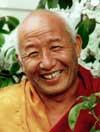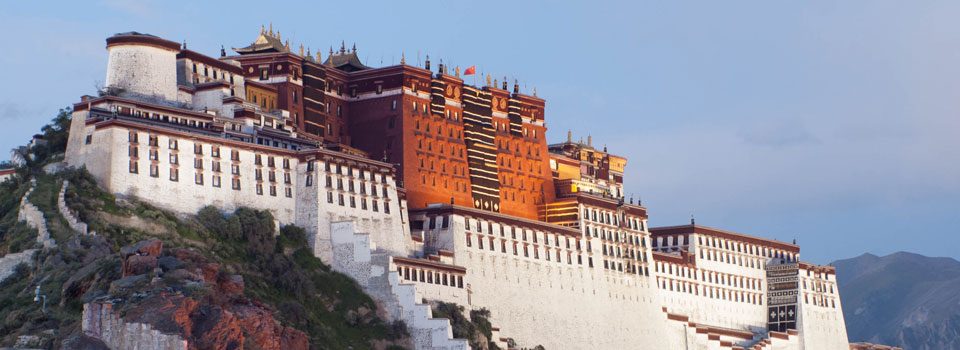| Venerable Geshe Tsulga (Tsultrim Choephel) was resident teacher at Kurukulla Center for Tibetan Buddhist Studies in Boston, MA. He passed away in November 2010.
In this book, the highly learned and revered teacher Geshe Tsulga offers a concise explanation of how to put the Buddha's teachings into practice, with emphasis on the early stages of the path and guru devotion. Suitable for both beginners and advanced students. An excerpt of this book is included below. Click here to download the full English and Tibetan version of the book. |

How to Practice the Buddhadharma
A Lamp Illuminating the Path to Liberation
When practicing Buddhadharma it should be practiced not just for this life but with thoughts of benefit in the next life onward. After all, working for the fleeting comforts of this life is not confined to humans. Even among animals there are many who do the same. The difference between humans and animals, therefore, should be determined by the ability to think long term.
Therefore, the purpose of practicing Buddhadharma is to avoid the experience of, or to eliminate totally, the suffering that none of us wants and to gain the temporary and lasting happiness we all desire. Happiness and suffering arise from their own causes and conditions. They do not appear without prior causes and conditions, nor are they produced by a creator of the world. Therefore, one should first know or identify the causes of suffering and happiness. Then, because suffering is an unwanted phenomenon, the causes and conditions of suffering should be destroyed. Suffering is a result created from causes and if the causes and conditions to create that result are not there, suffering cannot arise. For example, if the seed of a flower is missing, no flower can grow.
Likewise, if we wish to have happiness, we should learn the causes of happiness through an investigation that searches for the causes and conditions that produce happiness. Then, we should work to gather these causes of happiness with great determination. If the creation of these causes and conditions is complete, it is not possible for the fruit of happiness not to arise. For example, if rice seeds, water, fertilizer, and so forth are present in the fields during spring, a good harvest will follow in autumn. If they are not present, no harvest is possible. Practice should consist of methods to eliminate nonvirtuous activity and mental afflictions, the very causes of suffering, and to bring the causes of happiness—faith, wisdom and their associated practices—into one’s being. These two kinds of practice is what is meant by the practice of Dharma.
Moreover, the term "Dharma" means to hold or to protect. If one practices Dharma well, one will be held back from falling into the depths of the lower realms or from the fear of being reborn in such places and will be protected from such suffering. Furthermore, Dharma in this context of "practice" should be understood as being a method to remake the practitioner's way of thinking, or to transform his or her mind.
Since beginningless time we sentient beings have been thinking only about one life and of ourselves alone. In this way countless eons have passed. During that time our thoughts and wishes have been only for happiness and yet never, not even for an instant, have we found the happiness to satisfy our desires. Instead, we have helplessly experienced and will continue to experience every possible unwanted suffering from the Hell of Respite up to the Peak of Existence for eons and eons. All this time, we have been without protection, without guidance, with no gain or benefit for oneself and others. At no time have we risen out of this desperate situation. Not knowing the causes of happiness and suffering we engage in wrong practice, falling prey to unwanted suffering, and have not attained our desired goal of happiness. In the Guide to the Bodhisattva’s Way of Life it says:
Although we wish to be free of suffering,
we run toward the causes of suffering.
Although we wish for happiness,
with ignorance we destroy it
as if it were our enemy.
As this quote points out suffering is a result of misunderstanding what is to be eradicated and what is to be cultivated. Therefore, without letting ourselves fall under the influence of the old mind that thinks only of this life and only of ourselves, we should now transform our way of thinking. Concerning this bad attitude of cherishing oneself alone Panchen Lozang Chokyi Gyaltsen says in the Guru Puja:
This chronic disease of cherishing ourselves
is the cause of unwanted suffering.
Seeing this, we hold it in contempt and as worthy of blame.
Bless us to destroy the demon of selfishness.
In the same text he says:
Self cherishing is the road to every trouble.
In the Guide to the Bodhisattva’s Way of Life it says:
Thinking of our ourselves is the doctrine of the devil.
We should look upon this self-cherishing attitude as our principal enemy who has dealt ourselves and others so much suffering since time without beginning. Therefore, by turning away from this unbefitting and ingrained attitude we should develop the mind that thinks about happiness for ourselves and others from the next life onward as well as an attitude that works toward that end. By training in Buddhadharma it is possible to change our minds to such a way of thinking. If we train ourselves through the proper practice of Dharma, working for the benefit of future lives and not for this life alone, with the thought of working for others and not for ourselves alone, then our minds can be led into that direction. Therefore, Dharma has been spoken of as that which holds us from the abyss, protects us from fear, tames the mind, remakes the mind, and transforms the mind, and it should be understood in this way.
Whether one thinks from the perspective of all sentient beings wanting happiness or from the perspective of all sentient beings not wanting suffering, one should practice Dharma. Take this human rebirth that we have now, for example. In a past life as human beings we prayed to be reborn as human beings specially endowed with ten favorable conditions for achieving liberation and omniscience and to be free from the eight great obstacles. Alongside that prayer, we practiced giving, kept the morality that restrained from the ten nonvirtuous activities, practiced patience, developed determination, dwelt in meditative absorption, practiced wisdom, and so on. Because of these perfect causes and conditions, we have now gained this human form complete with its eight leisures and ten endowments, and we are free from the suffering of lower realms. Therefore, from now on until we die we should practice a Dharma that brings happiness to others and to our own future lives. The incomparable Atisha said:
A rebirth complete in leisure and endowment is very difficult to gain.
Even attained it is so difficult to find once more.
Strive in practice, therefore, and make it meaningful.
A buddha has appeared, a Sangha community exists,
you have gained this hard-to-find human rebirth,
a teacher so difficult to meet has been found,
do not render it meaningless.
As this quote explains, we have gained this precious form with its leisure and endowments, met with the precious teachings of the Buddha, and met with the teacher or guru who flawlessly shows us the path. These and every other favorable internal and external condition for the practice of Dharma have come together at this one time. Now we must give this achievement of a human rebirth meaning and power. If that were not possible, we would have to conclude that there is no difference between being born as a human and being born as a dog.
Our unwanted sufferings are those of the lower realms and those of cyclic existence. Within our being we possess the complete causes and conditions for birth in the lower realms. Therefore, not only is it difficult to gain a higher rebirth but there is every danger immediately after we die of being born against our wishes in the prison of lower realms, where we are certain to experience unbearable suffering. The Guide to the Bodhisattva’s Way of Life says:
If nonvirtuous activity performed for an instant
can produce an eon in the Hell without Respite,
what need is there to say that nonvirtuous activity
accumulated since beginningless time
will not produce birth in higher realms.
Within us nonvirtuous activity is stronger than virtuous, and the mind, therefore, is held or bound by mental afflictions. This means that even neutral states of mind, not to mention virtuous, do not arise that often. This is because our minds naturally gravitate toward nonvirtue. Such activities, in terms of their fields, motivating thoughts, bases, and objects, have great strength and it will be difficult to purify ourselves of them totally before we die by means of confession and strong resolution.
Generally, virtuous activity is rare, and such activity when it is performed is often impure from the point of view of its preparation, undertaking, and conclusion. However we look at it, in our next life there can be no rebirth other than one in the lower realms. Born as a hell being, hungry ghost, or animal, our suffering will be so great and our minds so ignorant that we will not know at all the practices of cultivating virtue and eradicating nonvirtue. Even hearing the words of such practices will be rare. Most lower-realm beings under the power of coarse afflictions such as anger amass nonvirtuous karma again and again, and in their rebirths they migrate lower and lower with never a chance to be reborn in happier realms. The Guide to the Bodhisattva’s Way of Life says,
By engaging in no virtuous activity,
but amassing the nonvirtuous,
for a hundred billion eons
even the words "happier realms"
will not be heard.
The same text says:
Having experienced it one is not free,
for during the experience
more nonvirtue is gathered.
Therefore, in order not to be born in those lower realms in future lives, we should practice a pure Dharma. In our practice of eradicating nonvirtue and cultivating virtue we should not fall under the spell of laziness and think to put it off until tomorrow, next month, next year or next life. Rather we should begin right now because practice must be undertaken before
we die and our time of death is uncertain. Je Gungtangpa said:
Before the tomorrow of Dharma practice
there is danger that the death of today will arrive.
Now, without deluding yourselves,
if you want to practice Dharma, do it today.
